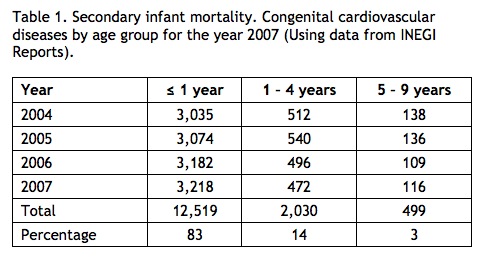Heart Disease Statistics
Congenital heart diseases are the number birth defect. Just in the United States, more than 25,000 babies are born each year with a congenital heart defect. This translates into more than 1 in 115 to 150 births. To put this into perspective, only one of each 800 to 1,000 babies are born with Down Syndrome.
Sometimes the defect is so minor that there are no apparent symptoms. In other cases it is so severe that newborn becomes ill a few days after birth. Sometimes the signs and symptoms happen only in late childhood. Severe heart defects often require multiple surgeries, a life of taking medications, and preventive measures for a good functioning of the heart and a healthy body. For some patients the only hope is a heart transplant.
Statistics
According to he American Heart Association (AHA), in 1992 heart defects represented 31.4% of the deaths related to birth defects. From 1986 to 1996, the rate of mortality due to congenital cardiovascular defects was reduced by 18.2 percent. Estimates are that in 1996 300,000 children under the age of 21 had a congenital cardiovascular disease. 38% of them had one or more surgical procedures performed. Each day more children cardiac defects are treated successfully. More research is needed to satisfy the medical needs of patients with heart defects when they reach adulthood.
At least 500,000 children in the United States have some type of cardiac problem. (excluding hypertension). Currently, there are over one million people in the US who live with congenital heart defects (AHA). Heart defects can be part of wider pattern of birth dfects. Pore then a third of children with Down Syndrome have heart defects (March of Dimes).
According to the United Network for Organ Sharing (UNOS), in 1997 there were 277 heart transplants in children between 0 and 17 years of age. In 1198 there were 265 heart transplants. Evidently there is a need to raise consciousness of the necessity of organ donations.
The prevalence of reported congenital heart diseases for every 1,000 live births is 2.1 in New England. It is 2.17 en the United States and Toronto, Canada. 8.6 in Navarra, Spain; 10.6 in Japan an 12.3 in Florence, Italy, to mention just a few reports.
The prevalence of congenital heart diseases in in Mexico is unknown. As a cause of child deaths, it is placed at number six in children less than a year old and as the third cause in children between one an four years of age. Based on the rate of births, we can estimate that 10 to 12 thousand Mexican children are born each year with some type of congenital heart problem.
The Cause of Congenital Heart Defects
Most of the time scientists do not know why a heart develops abnormally. It appears that genetics and the surrounding environment play a role, but no one knows exactly how.

Some heart defects have a clear genetic relationship – such as Long QT syndrome, one of the causes for sudden death in otherwise healthy individuals. Long QT syndrome may be present in one of every 5,000 people (about 50,000 people in the United States) and may cause up to 3,000 deaths per year, particularly in children and young adults. However, this condition is not diagnosed frequently. According to the SADS Foundation (Sudden Arrhythmia Death Syndrome), the symptoms are: unexplained fainting spells (medical term: syncope) and heart stoppages.
One virus in particular, rubella (German measles), may cause heart defects when a woman contracts the disease during the first three months of pregnancy (March of Dimes).
During pregnancy, taking certain medications such as Accutane (for acne), and possibly, some medications to fight convulsions, increase the risk of having a child with a birth defect. Babies born with Fetus Alcohol Syndrome (FAS) frequently have heart defects. Consuming cocaine during frequency also increases the risk of birth defects (March of Dimes).
Some chronic diseases in the mother may also increase the risk of cardiac defects, such as women with diabetes. The risk may be eliminated or controlled if the diabetes is strictly controlled before becoming pregnant. Women with a chemical problem known as phenylketonuria are in risk unless they follow a special diet starting before pregnancy.

